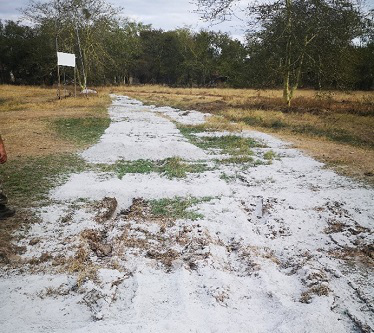A collaboration between SANEDI, Eskom Holdings and Department of Defence, has mitigated a potential health threat caused by a spill of raw human sewage from informal ablution facilities at a temporary Covid-19 support station. Before this could become an ecological issue, the quick-action and teamwork of the three partners remediated the situation through the use of a unique approach in environmental amelioration.
During the first wave of the Covid-19 pandemic of 2020 in Lephalale, Limpopo in South Africa, a raw sewage spill occurred between 1 to 28 July 2020, which formed a gully flowing into a grassland area. Unfortunately, more often than not, human excreta carries seeds of exotic plants due to our dietary intake. The impacted area is mainly used for recreational purposes such as physical sport and training exercises. From a military utilisation perspective, it was therefore imperative that the area remains as it was before the sewage spill incident occurred (relating to basal cover and soil pH). Therefore, ideally, the existing grass cover (Cynodon dactylon – “kweek grass”) should remain vigorous and intact to ensure alien plants do not establish in the area. Thus, this spill presented not only a potential health hazard, but also a potentially negative ecological impact, which required immediate remediation in order to limit the possible spread of several diseases. Due to the urgency of this environmental contamination, a rapid response was required to neutralise the potential health threat.



